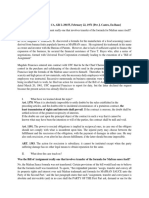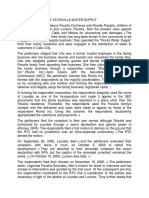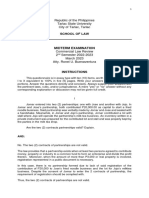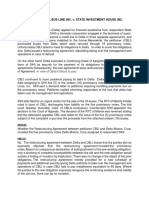OCCENA v. JABSON
OCCENA v. JABSON
Uploaded by
RizzaCopyright:
Available Formats
OCCENA v. JABSON
OCCENA v. JABSON
Uploaded by
RizzaCopyright
Available Formats
Share this document
Did you find this document useful?
Is this content inappropriate?
Copyright:
Available Formats
OCCENA v. JABSON
OCCENA v. JABSON
Uploaded by
RizzaCopyright:
Available Formats
285. OCCENA v.
JABSON
FACTS:
Private respondent Tropical Homes, Inc had a subdivision contract with petitioners who
are the owners of the land subject of subdivision development by private respondent.
The contract stipulated that the petitioners’ fixed and sole share and participation is the
land which is equivalent to forty percent of all cash receipts from the sale of the
subdivision lots. When the development costs increased to such level not anticipated
during the signing of the contract and which threatened the financial viability of the
project as assessed by the private respondent, respondent filed at the lower court a
complaint for the modification of the terms and conditions of the contract by fixing the
proper shares that should pertain to the parties therein out of the gross proceeds from
the sales of the subdivision lots. Petitioners moved for the dismissal of the complaint for
lack of cause of action. The lower court denied the motion for dismissal which was
upheld by the CA based on the civil code provision that “when the service has become
so difficult as to be manifestly beyond the contemplation of the parties, the obligor may
also be released therefrom, in whole or in part”. Insisting that the worldwide increase in
prices cited by private respondent does not constitute a sufficient cause of action for the
modification of the terms and conditions of the contract, petitioners filed the instant
petition.
ISSUE:
Whether private respondent may demand modification of the terms of the contract on
the ground that the prestation has manifestly come beyond the contemplation of the
parties
RULING:
No. SC ruled in favour of the Petitioner and granted the petition on Basis that there is no
cause of action and misapplication of Article 1267 While respondent court correctly cited
in its decision the Code Commission's report givingThe general rule is that impossibility
of performance releases the obligor. However, it is submitted that when the service has
become so difficult as to be manifestly beyond the contemplation of the parties, the
court should be authorized to release the obligor in whole or in part. The intention of the
parties should govern and if it appears that the service turns out to be so difficult as
have been beyond their contemplation, it would be doing violence to that intention to
hold the obligor still responsible.It misapplied the same to respondent's complaint.
If respondent's complaint were to be released from having to comply with the
subdivision contract, assuming it could show at the trial that the service undertaken
contractually by it had "become so difficult as to be manifestly beyond the contemplation
of the parties", then respondent court's upholding of respondet's complaint and
dismissal of the petition would be justifiable under the cited codal article. Without said
article, respondent would remain bound by its contract under the theretofore prevailing
doctrine that performance therewith is ot excused "by the fact that the contract turns out
to be hard and improvident, unprofitable, or unespectedly burdensome", 3 since in case
a party desires to be excuse from performance in the event of such contingencies
arising, it is his duty to provide threfor in the
contract.chanroblesvirtualawlibrarychanrobles virtual law library
But respondent's complaint seeks not release from the subdivision contract but that the
court "render judgment I modifying the terms and Conditions of the Contract by fixing
the proper shares that should pertain to the herein parties out of the gross proceed.,
from the sales of subdivided lots of subject subdivision". The cited article does not grant
the courts this authority to remake, modify or revise the contract or to fix the division of
shares between the parties as contractually stipulated with the force of law between the
parties, so as to substitute its own terms for those covenanted by the
partiesthemselves. Respondent's complaint for modification of contract manifestly has
no basis in law and therefore states no cause of action. Under the particular allegations
of respondent's complaint and the circumstances therein averred, the courts cannot
even in equity grant the relief sought.
You might also like
- Due Diligence ChecklistDocument10 pagesDue Diligence ChecklistVikasdeep SharmaNo ratings yet
- Baluran v. NavarroDocument1 pageBaluran v. NavarroRizzaNo ratings yet
- NPPE NotesDocument31 pagesNPPE NotesAdam ZafarNo ratings yet
- PNB V PHIL. VEGETABLE OILDocument2 pagesPNB V PHIL. VEGETABLE OILRizzaNo ratings yet
- Doran ComplaintDocument4 pagesDoran ComplaintWade Smith - Executive ProducerNo ratings yet
- Advertising Agency AgreementDocument7 pagesAdvertising Agency AgreementRocketLawyer100% (1)
- Republic v. CastellviDocument2 pagesRepublic v. CastellviJcNo ratings yet
- Consti Law II Mid-Term Review 2014Document2 pagesConsti Law II Mid-Term Review 2014Audrey MartinNo ratings yet
- Filinvest Vs AdiaDocument4 pagesFilinvest Vs AdiajessapuerinNo ratings yet
- Velasco v. CaDocument2 pagesVelasco v. CaDennis CastroNo ratings yet
- Pp. Consuelo (Eminent Domain)Document4 pagesPp. Consuelo (Eminent Domain)Gynes ValencianoNo ratings yet
- VOL. 456, APRIL 21, 2005 475: Yumol, Jr. vs. Ferrer, SRDocument12 pagesVOL. 456, APRIL 21, 2005 475: Yumol, Jr. vs. Ferrer, SRAngelie FloresNo ratings yet
- CONTRACTS Definition Stages1 With AnswersDocument13 pagesCONTRACTS Definition Stages1 With AnswersAnabelle McKenlyNo ratings yet
- 37 Rustan Vs IAC - Conditional ObligationsDocument2 pages37 Rustan Vs IAC - Conditional ObligationsJoyelle Kristen TamayoNo ratings yet
- NAPOCOR V Heirs of BorbonDocument2 pagesNAPOCOR V Heirs of BorbonFerdinand Uy100% (1)
- De Ongsiako vs. GamboaDocument4 pagesDe Ongsiako vs. GamboaJoey SalomonNo ratings yet
- Universal Food Corp. v. CADocument2 pagesUniversal Food Corp. v. CAAiress Canoy CasimeroNo ratings yet
- Laguna vs. Manabat: FactsDocument2 pagesLaguna vs. Manabat: Factsrach casimNo ratings yet
- Immaculata v. NavarroDocument1 pageImmaculata v. NavarroIvan BernardNo ratings yet
- Cabague v. AuxilioDocument1 pageCabague v. AuxilioEszle Ann L. ChuaNo ratings yet
- (Agency) 37 - Manila Memorial Park Cemetery v. Linsangan DigestDocument3 pages(Agency) 37 - Manila Memorial Park Cemetery v. Linsangan Digestchan.aNo ratings yet
- 6 Naawan Community vs. CA (2003)Document1 page6 Naawan Community vs. CA (2003)BananaNo ratings yet
- Marcos Vs Manglapus 178 Scra 760Document6 pagesMarcos Vs Manglapus 178 Scra 760Chard CaringalNo ratings yet
- Crimpro Digests MidtermsDocument24 pagesCrimpro Digests MidtermsVictoria EscobalNo ratings yet
- Consolidated CasesDocument41 pagesConsolidated CasesChi OdanraNo ratings yet
- Essential Elements - Status1Document6 pagesEssential Elements - Status1Giee De GuzmanNo ratings yet
- Philippine National Bank vs. Intermediate Appellate Court: - First DivisionDocument6 pagesPhilippine National Bank vs. Intermediate Appellate Court: - First DivisionDorky DorkyNo ratings yet
- Documents - Pub - Sales Notes UribeDocument22 pagesDocuments - Pub - Sales Notes Uribesoyoung kimNo ratings yet
- Civpro Rule-47Document10 pagesCivpro Rule-47Rille Ephreim AsisNo ratings yet
- Ansay vs. NDC, G.R. No 13667, April 29, 1960Document2 pagesAnsay vs. NDC, G.R. No 13667, April 29, 1960Johanna JoshNo ratings yet
- Nario V Philam LifeDocument5 pagesNario V Philam Lifecmv mendozaNo ratings yet
- HEIRS OF FRANCO V GONZALESDocument2 pagesHEIRS OF FRANCO V GONZALESbantucin davooNo ratings yet
- (Rovila Inc.) (Sec) : AcihcdDocument8 pages(Rovila Inc.) (Sec) : AcihcdGIGI KHONo ratings yet
- Bible Baptist Church vs. CADocument3 pagesBible Baptist Church vs. CAirene anibongNo ratings yet
- KATHLEEN ObliCon Digests Baylon EndDocument14 pagesKATHLEEN ObliCon Digests Baylon EndDatu TahilNo ratings yet
- Edgar Ledonio Vs Capitol Devt CorpDocument13 pagesEdgar Ledonio Vs Capitol Devt CorpGennard Michael Angelo AngelesNo ratings yet
- PNB Vs Acero (Art.1278)Document1 pagePNB Vs Acero (Art.1278)LoveAnneNo ratings yet
- Clemente v. RepublicDocument3 pagesClemente v. RepublicDyords TiglaoNo ratings yet
- Francisco C. Eizmendi Jr. vs. Teodorico P. Fernandez (Full Text, Word Version)Document16 pagesFrancisco C. Eizmendi Jr. vs. Teodorico P. Fernandez (Full Text, Word Version)Emir MendozaNo ratings yet
- Sps. Virgilio G. Tamayo, Et Al. vs. Heirs of Gavino DominguezDocument5 pagesSps. Virgilio G. Tamayo, Et Al. vs. Heirs of Gavino DominguezjafernandNo ratings yet
- Tan v. CA, GR 116285, 367 SCRA 571 (2001)Document9 pagesTan v. CA, GR 116285, 367 SCRA 571 (2001)Andrei Hans Ochoa PunoNo ratings yet
- 1definition To Breach1B (D2Plurality - D5Accessory)Document2 pages1definition To Breach1B (D2Plurality - D5Accessory)Cars CarandangNo ratings yet
- Bustos V Lucero - Digest3Document3 pagesBustos V Lucero - Digest3ruben caresosa100% (1)
- Lawrence V TexasDocument2 pagesLawrence V TexasAnonymous bOncqbp8yiNo ratings yet
- Legal Forms Digests FinalDocument55 pagesLegal Forms Digests Finalarden1imNo ratings yet
- GR NO 170530 Sagasso Construction vs. PPADocument1 pageGR NO 170530 Sagasso Construction vs. PPAHAULA BARA-ACALNo ratings yet
- 8 Zulueta V MarianoDocument2 pages8 Zulueta V MarianoFritz SaponNo ratings yet
- Gutierrez Hermanos vs. OrenseDocument1 pageGutierrez Hermanos vs. OrenseEarlene DaleNo ratings yet
- Zulueta v. Mariano, GR L-29360, January 30, 1982 (Per J. Melencio-Herrera, FirstDivision) (Reviewed)Document2 pagesZulueta v. Mariano, GR L-29360, January 30, 1982 (Per J. Melencio-Herrera, FirstDivision) (Reviewed)Steve UyNo ratings yet
- Carbonnel v. Poncio, Et Al. G.R. No. L-11231, 12 May 1958Document1 pageCarbonnel v. Poncio, Et Al. G.R. No. L-11231, 12 May 1958Lexa L. DotyalNo ratings yet
- LO V KJS ECODocument3 pagesLO V KJS ECOEcnerolAicnelavNo ratings yet
- Corp Sec Notes 5Document15 pagesCorp Sec Notes 5Jorge Bandola100% (1)
- Mr. Rek Lamador: Art. 202. Support in The Cases Referred To in The Preceding Article Shall BeDocument3 pagesMr. Rek Lamador: Art. 202. Support in The Cases Referred To in The Preceding Article Shall BeCheska Christiana SaguinNo ratings yet
- AGENCY Summer Ed.Document109 pagesAGENCY Summer Ed.AshAngeLNo ratings yet
- Kauffman vs. National Bank, 42 Phil 182: Facts: The Defendant Bank, For A ValuableDocument5 pagesKauffman vs. National Bank, 42 Phil 182: Facts: The Defendant Bank, For A ValuableApple Gee Libo-onNo ratings yet
- CommRev Del Rosario Roxanne Midterm ExamDocument8 pagesCommRev Del Rosario Roxanne Midterm ExamtowanNo ratings yet
- Passive VirtuesDocument4 pagesPassive VirtuesNikki AndradeNo ratings yet
- 17 Transcept Construction vs. AguilarDocument6 pages17 Transcept Construction vs. Aguilarapple_doctoleroNo ratings yet
- 324 Floro Vs CA and RabbitDocument1 page324 Floro Vs CA and RabbitJoseff Anthony FernandezNo ratings yet
- Gan Tion V CADocument3 pagesGan Tion V CAslashNo ratings yet
- 517 - Cebu v. CA, 407 SCRA 154Document2 pages517 - Cebu v. CA, 407 SCRA 154Reynaldo Lepatan Jr.No ratings yet
- Jurisdictions of Philippine CourtsDocument5 pagesJurisdictions of Philippine CourtsJomarco SantosNo ratings yet
- Case Facts Issues Ruling: To Secure, There Can Be No SecurityDocument2 pagesCase Facts Issues Ruling: To Secure, There Can Be No SecurityRogelio Rubellano IIINo ratings yet
- G.R. No. L-48889 - Development Bank of The Philippines v. Adil PDFDocument4 pagesG.R. No. L-48889 - Development Bank of The Philippines v. Adil PDFFranco AguiluzNo ratings yet
- RODOLFO G. CRUZ and ESPERANZA IBIAS, Petitioners, - ATTY. DELFIN GRUSPE, RespondentDocument9 pagesRODOLFO G. CRUZ and ESPERANZA IBIAS, Petitioners, - ATTY. DELFIN GRUSPE, RespondentReyna RemultaNo ratings yet
- Occena Law Office For Petitioners. Serrano, Diokno & Serrano For RespondentsDocument3 pagesOccena Law Office For Petitioners. Serrano, Diokno & Serrano For RespondentsVeraNataaNo ratings yet
- ASUNCION v. CADocument2 pagesASUNCION v. CARizzaNo ratings yet
- COMMERCIAL BANK & TRUST CO. v. BPIDocument1 pageCOMMERCIAL BANK & TRUST CO. v. BPIRizzaNo ratings yet
- 148 Chua V. Ca 301 SCRA 356 Mendoza DOCTRINE OF THE LAW: Lessor May Judicially Eject The Lessee When The PeriodDocument1 page148 Chua V. Ca 301 SCRA 356 Mendoza DOCTRINE OF THE LAW: Lessor May Judicially Eject The Lessee When The PeriodRizzaNo ratings yet
- BISTRANCO v. SANCHEZDocument2 pagesBISTRANCO v. SANCHEZRizzaNo ratings yet
- DAUDEN-HERNAEZ v. DE LOS ANGELESDocument1 pageDAUDEN-HERNAEZ v. DE LOS ANGELESRizzaNo ratings yet
- 202 Alipio V. Ca G.R. No. 134100 Mendoza, J. DOCTRINE OF THE LAW: If From The Law or The Nature or The Wording of The ObligationDocument1 page202 Alipio V. Ca G.R. No. 134100 Mendoza, J. DOCTRINE OF THE LAW: If From The Law or The Nature or The Wording of The ObligationRizzaNo ratings yet
- AEROSPACE CHEMICAL v. CADocument1 pageAEROSPACE CHEMICAL v. CARizza100% (1)
- MODINA v. CADocument1 pageMODINA v. CARizzaNo ratings yet
- G.R. No. 204964Document11 pagesG.R. No. 204964RizzaNo ratings yet
- CASE DIGEST (G.R. No. L-45892)Document1 pageCASE DIGEST (G.R. No. L-45892)Rizza100% (1)
- Article 11 ReviewerDocument21 pagesArticle 11 ReviewerRizzaNo ratings yet
- CALIFORNIA BUS LINE INC. v. STATE INVESTMENT HOUSE INC.Document2 pagesCALIFORNIA BUS LINE INC. v. STATE INVESTMENT HOUSE INC.RizzaNo ratings yet
- People V.pastorDocument2 pagesPeople V.pastorRizza100% (1)
- TRILLANA v. QUEZON COLLEGEDocument1 pageTRILLANA v. QUEZON COLLEGERizzaNo ratings yet
- RODRIGUEZ v. RODRIGUEZDocument2 pagesRODRIGUEZ v. RODRIGUEZRizzaNo ratings yet
- Shariah LawDocument3 pagesShariah LawRizzaNo ratings yet
- G.R. No. 139465Document1 pageG.R. No. 139465RizzaNo ratings yet
- Co v. PNBDocument14 pagesCo v. PNBNorie SapantaNo ratings yet
- Comprehensive Exam: Attempt HistoryDocument44 pagesComprehensive Exam: Attempt HistoryJoel Kennedy BalanayNo ratings yet
- Provisional Sums vs. Prime CostsssdsdDocument23 pagesProvisional Sums vs. Prime CostsssdsdadamriswanNo ratings yet
- Olympia Housing Inc. vs. Lapastora, GR No. 187691, Jan. 13, 2016Document2 pagesOlympia Housing Inc. vs. Lapastora, GR No. 187691, Jan. 13, 2016Ma Alyssa Rea NuñezNo ratings yet
- Heiss & Dawson's Motion To DismissDocument24 pagesHeiss & Dawson's Motion To Dismissc_heller100% (1)
- Design of Catering FacilitiesDocument100 pagesDesign of Catering FacilitiesTaraja JacksonNo ratings yet
- Concept of Funds-Dr. Loida M. CancinoDocument81 pagesConcept of Funds-Dr. Loida M. CancinoAricirtap Abenoja JoyceNo ratings yet
- Anti-Suit Injunctions in Private International LawDocument19 pagesAnti-Suit Injunctions in Private International LawAnmol GoswamiNo ratings yet
- Massachusetts General Laws Chapter 30b - ManualDocument154 pagesMassachusetts General Laws Chapter 30b - ManualWilliam F. ZachmannNo ratings yet
- Aliviado vs. Procter - Gamble Phils., Inc.Document23 pagesAliviado vs. Procter - Gamble Phils., Inc.EMELYNo ratings yet
- Top Tips 8 Essential Elements To A Successful ClaimDocument5 pagesTop Tips 8 Essential Elements To A Successful ClaimMuhammad ArslanNo ratings yet
- Special Business Plan - 150 AEDDocument5 pagesSpecial Business Plan - 150 AEDAli Umair SheikhNo ratings yet
- Areola Vs CA, 236 SCRA 643Document2 pagesAreola Vs CA, 236 SCRA 643rengieNo ratings yet
- Slide 4Document21 pagesSlide 4AbdulAhadNo ratings yet
- RetrenchmentDocument5 pagesRetrenchmentIbban JavidNo ratings yet
- Supporting Good Practice in Managing Employment RelationsDocument10 pagesSupporting Good Practice in Managing Employment Relationszahid328860% (5)
- LLB Syllabus 3 YearDocument49 pagesLLB Syllabus 3 YearUTTAMNo ratings yet
- 78 Phil LJ1Document26 pages78 Phil LJ1IAN ANGELO BUTASLACNo ratings yet
- Depra vs. Dumlao GR No. L-57348 May 16, 1985Document8 pagesDepra vs. Dumlao GR No. L-57348 May 16, 1985lassenNo ratings yet
- 066 Quiambao - v. - China - Banking - Corp. GR 238462Document8 pages066 Quiambao - v. - China - Banking - Corp. GR 238462krinnie1412No ratings yet
- Alternative Dispute Resolution: University of Santo TomasDocument1 pageAlternative Dispute Resolution: University of Santo Tomasmanol_salaNo ratings yet
- Shubhankar - KIMURA K K PDFDocument1 pageShubhankar - KIMURA K K PDFshubhan001No ratings yet
- Contracts Chapter 2 JuradoDocument6 pagesContracts Chapter 2 JuradoSha NapolesNo ratings yet
- MTN MOBILE MONEY Consumer Terms and Conditions 0519Document16 pagesMTN MOBILE MONEY Consumer Terms and Conditions 0519TOORACH JOELNo ratings yet
- Chavez V NLRCDocument2 pagesChavez V NLRCFayda Cariaga100% (2)
- SALES (Atty Rachel Castro)Document20 pagesSALES (Atty Rachel Castro)KrisLarrNo ratings yet












































































































